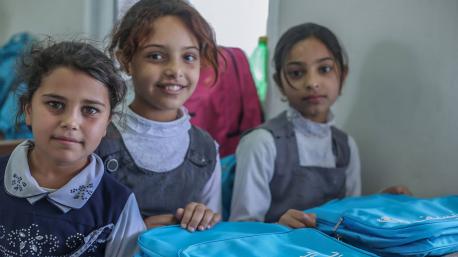
UNICEF in Iraq
UNICEF works with partners in Iraq to reach vulnerable children with the health care, education and protection they need to survive and thrive.
In Iraq, over 5 million people — about half of them children — require humanitarian assistance
The people of Iraq continue to suffer the brutal effects of years of conflict and sectarian violence and COVID-19.
Although armed violence has declined, many children and families live in unstable areas where security remains a major concern. Efforts to recover and build resilience were hobbled by the COVID-19 crisis coupled with a severe downturn in the economy. Those displaced by war and living in camps are being displaced again as government camps are shut.
Pandemic-related school closures affected millions of children, jeopardizing their futures and heightening risks of violence, exploitation and abuse. Only two in five households have safely-managed drinking water.
The number of children and adolescents living in poverty is on track to double, from 20 percent to 40 percent, according to country's own assessment conducted with support from UNICEF and the World Bank.
Here's how UNICEF is helping children in Iraq
UNICEF's ongoing response is focused on helping Iraq's families rebuild their lives. With partners, UNICEF:
- enables access to safe water for drinking, cooking and personal hygiene
- supports the rehabilitation of water, sanitation and hygiene (WASH) facilities in schools and primary health care centers
- delivers learning supplies and trains teachers to support children's education
- trains humanitarian workers in gender-based violence prevention and response
- immunizes children against polio and other vaccine-preventable diseases
UNICEF is appealing for donor support in order to continue to improve and sustain essential services amid overlapping crises.
Help UNICEF save and protect vulnerable children in Iraq. Your donation is 100% tax deductible.